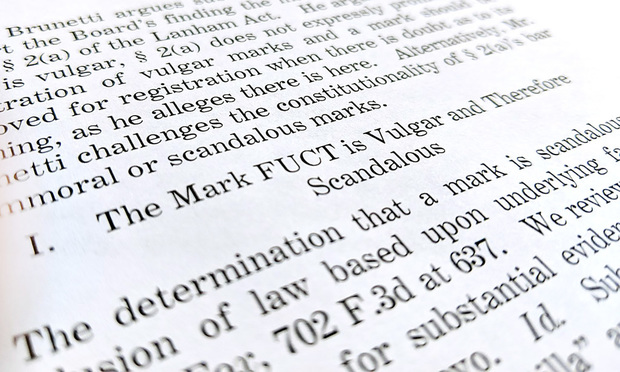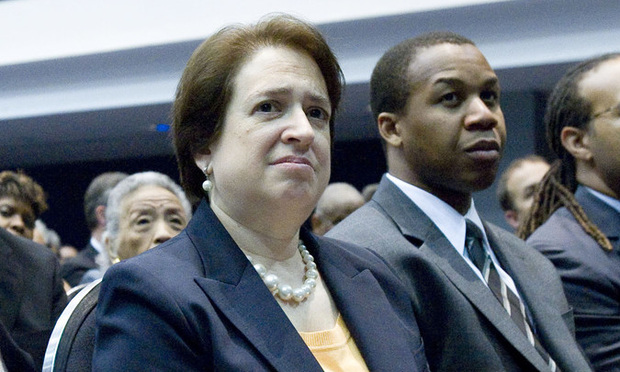Justices and Lawyers Sidestep Profanity in 'Scandalous' Trademark Case
Deputy Solicitor General Malcolm Stewart, who was defending the constitutionality of the law, came up with the most creative way of describing the word without saying it.
April 15, 2019 at 03:05 PM
3 minute read
 The U.S. solicitor general's petition in a trademark dispute over the mark "FUCT."
The U.S. solicitor general's petition in a trademark dispute over the mark "FUCT."
U.S. Supreme Court justices and the lawyers arguing before them went out of their way Monday to avoid the four letters at the very core of the case of Iancu v. Brunetti: FUCT.
The issue in the First Amendment case was whether "FUCT," the name of Erik Brunetti's line of clothing, could be trademarked, or whether it would violate the Lanham Act, which bans registration of "immoral … or scandalous matter."
Deputy Solicitor General Malcolm Stewart, who was defending the constitutionality of the law, came up with the most creative way of describing the word without saying it. "This mark," Stewart said to the justices, "would be perceived by a substantial segment of the public as the equivalent of the profane past participle form of a well-known word of profanity and perhaps the paradigmatic word of profanity in our language."
Later he condensed that mouthful of alliterative words to: "the past participle form of the paradigmatic profane word in our culture." Stewart added, "It's hard to see what would be covered [by the law] if this is not."
Several justices seemed to search for a line that could be drawn to deny registration to some words without running afoul of the First Amendment. But justices were also aware that the momentum of pro-free speech decision-making by the court in recent years has made drawing that line difficult. Just two years ago, in Matal v. Tam, the court ruled that disparaging marks could not be denied registration under the Lanham Act.
 Justice Elena Kagan. (Photo: Diego M. Radzinschi/ALM)
Justice Elena Kagan. (Photo: Diego M. Radzinschi/ALM)As they struggled to find the line, the justices avoided uttering FUCT and related words themselves. Justice Elena Kagan called them "those words," and Justice Stephen Breyer sidestepped by saying, "Most people know what words we're talking about."
Chief Justice John Roberts Jr., who has two teenage children old enough to have heard if not spoken expletives, sympathized with the plight of "parents who are trying to teach their children not to use those kinds of words" who might see people wearing FUCT clothing while walking with their children in a shopping mall.
John Sommer, the California lawyer representing Brunetti, pledged beforehand in his brief that at oral argument, he would not utter the word that he wants to be trademarked. "It is not expected that it will be necessary to refer to vulgar terms during argument," Sommer wrote in a footnote.
Sommer kept his promise, though he spelled out similar words like FVCK and FCUK that have won trademark protection.
When Stewart said words like PHUC would be examined in context by the Patent and Trademark Office before deciding on whether it could be trademarked, Justice Neil Gorsuch made it clear he had had enough of the terminology.
"I don't want to go through the examples," Gorsuch exclaimed. "I really don't want to do that."
Read more:
Don't Expect Profanities to Fly When Justices Hear 'FUCT' Trademark Case
In Quoting Profanity, Some Judges Give a F#%&. Others Don't
Supreme Court to Review Patent Office Ban on Vulgar Trademarks
Federal Circuit Wrestles With Vulgar Trademarks in 'Fuct' Case
This content has been archived. It is available through our partners, LexisNexis® and Bloomberg Law.
To view this content, please continue to their sites.
Not a Lexis Subscriber?
Subscribe Now
Not a Bloomberg Law Subscriber?
Subscribe Now
NOT FOR REPRINT
© 2025 ALM Global, LLC, All Rights Reserved. Request academic re-use from www.copyright.com. All other uses, submit a request to [email protected]. For more information visit Asset & Logo Licensing.
You Might Like
View All
Trump's DOJ Delays Releasing Jan. 6 FBI Agents List Under Consent Order
3 minute read
Judge Grills DOJ on Trump’s Birthright Citizenship Executive Order

Perkins Coie Backs Challenge to Trump's Ban on Transgender Military Service
4 minute read
Selendy Gay Files Lawsuit Challenging Trump's Workforce Reclassification EO
2 minute readTrending Stories
- 1Orrick Picks Up 13-Lawyer Tech, VC Group From Gunderson Dettmer
- 2How Alzheimer’s and Other Cognitive Diseases Affect Guardianship, POAs and Estate Planning
- 3How Lower Courts Are Interpreting Justices' Decision in 'Muldrow v. City of St. Louis'
- 4Phantom Income/Retained Earnings and the Potential for Inflated Support
- 5Should a Financially Dependent Child Who Rejects One Parent Still Be Emancipated?
Who Got The Work
J. Brugh Lower of Gibbons has entered an appearance for industrial equipment supplier Devco Corporation in a pending trademark infringement lawsuit. The suit, accusing the defendant of selling knock-off Graco products, was filed Dec. 18 in New Jersey District Court by Rivkin Radler on behalf of Graco Inc. and Graco Minnesota. The case, assigned to U.S. District Judge Zahid N. Quraishi, is 3:24-cv-11294, Graco Inc. et al v. Devco Corporation.
Who Got The Work
Rebecca Maller-Stein and Kent A. Yalowitz of Arnold & Porter Kaye Scholer have entered their appearances for Hanaco Venture Capital and its executives, Lior Prosor and David Frankel, in a pending securities lawsuit. The action, filed on Dec. 24 in New York Southern District Court by Zell, Aron & Co. on behalf of Goldeneye Advisors, accuses the defendants of negligently and fraudulently managing the plaintiff's $1 million investment. The case, assigned to U.S. District Judge Vernon S. Broderick, is 1:24-cv-09918, Goldeneye Advisors, LLC v. Hanaco Venture Capital, Ltd. et al.
Who Got The Work
Attorneys from A&O Shearman has stepped in as defense counsel for Toronto-Dominion Bank and other defendants in a pending securities class action. The suit, filed Dec. 11 in New York Southern District Court by Bleichmar Fonti & Auld, accuses the defendants of concealing the bank's 'pervasive' deficiencies in regards to its compliance with the Bank Secrecy Act and the quality of its anti-money laundering controls. The case, assigned to U.S. District Judge Arun Subramanian, is 1:24-cv-09445, Gonzalez v. The Toronto-Dominion Bank et al.
Who Got The Work
Crown Castle International, a Pennsylvania company providing shared communications infrastructure, has turned to Luke D. Wolf of Gordon Rees Scully Mansukhani to fend off a pending breach-of-contract lawsuit. The court action, filed Nov. 25 in Michigan Eastern District Court by Hooper Hathaway PC on behalf of The Town Residences LLC, accuses Crown Castle of failing to transfer approximately $30,000 in utility payments from T-Mobile in breach of a roof-top lease and assignment agreement. The case, assigned to U.S. District Judge Susan K. Declercq, is 2:24-cv-13131, The Town Residences LLC v. T-Mobile US, Inc. et al.
Who Got The Work
Wilfred P. Coronato and Daniel M. Schwartz of McCarter & English have stepped in as defense counsel to Electrolux Home Products Inc. in a pending product liability lawsuit. The court action, filed Nov. 26 in New York Eastern District Court by Poulos Lopiccolo PC and Nagel Rice LLP on behalf of David Stern, alleges that the defendant's refrigerators’ drawers and shelving repeatedly break and fall apart within months after purchase. The case, assigned to U.S. District Judge Joan M. Azrack, is 2:24-cv-08204, Stern v. Electrolux Home Products, Inc.
Featured Firms
Law Offices of Gary Martin Hays & Associates, P.C.
(470) 294-1674
Law Offices of Mark E. Salomone
(857) 444-6468
Smith & Hassler
(713) 739-1250








